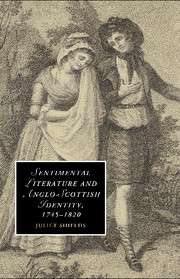Book contents
- Frontmatter
- Contents
- Acknowledgments
- Introduction: The politics and sentiments of union
- 1 The Ossian controversy and the racial beginnings of Britain
- 2 British masculinity and Scottish self-control
- 3 Sentimental correspondences and the boundaries of British identity
- 4 National tales and the domestication of the Scottish Highlands
- 5 Rebellions and re-unions in the historical novel
- Notes
- Bibliography
- Index
- CAMBRIDGE STUDIES IN ROMANTICISM
Introduction: The politics and sentiments of union
Published online by Cambridge University Press: 06 August 2010
- Frontmatter
- Contents
- Acknowledgments
- Introduction: The politics and sentiments of union
- 1 The Ossian controversy and the racial beginnings of Britain
- 2 British masculinity and Scottish self-control
- 3 Sentimental correspondences and the boundaries of British identity
- 4 National tales and the domestication of the Scottish Highlands
- 5 Rebellions and re-unions in the historical novel
- Notes
- Bibliography
- Index
- CAMBRIDGE STUDIES IN ROMANTICISM
Summary
On January 16, 1707, Scotland's Parliament ratified the Treaty of Union that would incorporate the Scottish into the English Parliament to form a new British state. On this momentous occasion, the Duke of Queensberry, one of the prime players in negotiating the Union, urged his fellow Scots “to become one in Hearts and Affections, as we are inseparably joyn'd in Interest with our Neighbour Nation.” Queensberry would be one of sixty-one Scots in the newly created 764-person British Parliament. He also stood to gain a large portion of the money that the English treasury had promised to pay Scottish peers in return for their acceptance of the terms of union outlined by England's Parliament. Despite his personal investments in the formation of a British state, Queensberry counseled Scots to understand the Union not merely as an economic and political partnership, but also as a sentimental or affective alliance. He implied that Scotland's and England's shared political and economic interests should foster a mutual, even familial, fondness among the inhabitants of the newly established Great Britain.
This book argues that Scottish writers from Tobias Smollett, Adam Smith, James Macpherson, Henry Mackenzie, and James Boswell in the middle of the eighteenth century to Christian Isobel Johnstone, Susan Ferrier, Walter Scott, James Hogg, and John Galt in the early nineteenth century responded to Scotland's loss of independent sovereignty by seeking in sentiment, or virtuous feeling, a compensation for political dispossession.
- Type
- Chapter
- Information
- Publisher: Cambridge University PressPrint publication year: 2010

